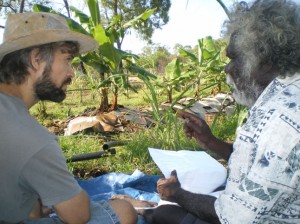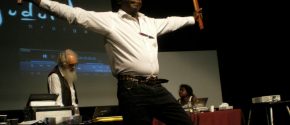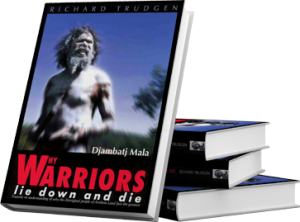
Across all the Aboriginal communities I have been involved in one common observation can be made: Balanda (dominant culture people) with the right attitude and a good heart can make a big difference. Yolŋu people have described it to me this way, ” Yolku ŋayaŋu-yolŋumirriw ŋapurr djäl.” “We want those with a soul for people”. This is their number one criteria for identifying useful Balanda personnel. Their reasoning is sound. Personnel in communities who put people-centred processes before policy, bureaucratic expectations, and achievement, have better local engagement and mobilise change in the long term.
The flip side is, the impact of such people seems to fade before the devastation created by “the system”. The system is ultimately a result of cross-cultural conflict and confusion, the result of a thousand assumptions, poor communications and ego-driven politics by the mainstream machine. This steamroller is most effectively maintained by the Governments of today – local, state and federal. Within the structures of departments and bureaucracies, we find the mechanisms that allow for the maintenance of a culture and policy that enforces the status quo – a system that does not hear, see or respond to the unique needs of the various Aboriginal communities in Australia. The steamroller is maintained by the men and women who naively go along with the assumptions, behaviours and expectations encouraged by the system. However, each individual worker on the ground has the ability to do something the Governments can’t: work with Aboriginal communities on the basis of values that respect people as people, recognizes local Aboriginal autonomy and focuses on good communication and good process. In this way, workers can participate in the transformation of communities.
A machine is something that carries out a function systematically, regardless of who is driving it. It not about who is the Minister for Aboriginal Affairs, and I am not talking about the current policy. A mechanical system focuses on right policy, the rules, but a human, more organic approach focuses on right process. Human process. Machines are not human – they are essentially heartless. Machines are built to produce products, results…. you enter in A, and B will be the result. Ultimately, Governments are rule and result focused, often with formulas that can be boiled down to so-much-money-in-for-said-results-out. Their multi-leveled hierarchy limits relational engagement with the local experience. Year after year, we see inflexible rules created in policies designed to attempt to force change: mandatory reporting of domestic violence, mandatory sentencing, increasing the severity of alcohol bans, complex welfare quarantining, fining parents and taking driver’s licenses as punishments for children not attending school. This is why Governmental approaches can never succeed in changing Indigenous communities. Because you can’t make communities or people change. The old saying, “You can lead a horse to water but you can’t make it drink,” is so true for any people who, because of their circumstances, have developed dependencies and addictions. But more to the point, you cannot even lead a horse to water unless it trusts you. This is where things for the Government fall apart in Aboriginal communities. No matter how precise the mechanism, how smoothly the policy operates, how targeted the strategies, if the Government can’t embody trust, give hope, share liberty and have empathy, then it can’t truly participate in the transformation of lives or communities. But you can!
The primary antidote to the sterility and inflexibility of the Government’s bureaucratic approach is personnel who are willing to put human process before the demands of a governmental culture. It means being a person that puts trust, respect and listening, before deadlines and predefined outcomes. It means bending the rules to make things work for people. And it means standing up to superiors who cannot understand local needs. It does not mean fighting every battle. It doesn’t mean ignoring your funding requirements, it means making them work for people.
Here are some questions we all need to ask ourselves:
Danger Signs
- Am I trying to fix Indigenous people like machines who need a mechanic? Am I trying to create solutions by simplistic input-output equations?
- Am I using, condoning, or considering using coercive or manipulative mechanisms to get people to do what I think is needed? Eg. offering food or freebies, removing liberties or withholding your services from people until they comply.
- Do I frequently use the words, “just” “should” or “why don’t they…” when referring to Aboriginal people or to solutions to the challenges in Aboriginal communities. Eg. “We just need to see better school attendance.” “They should stop living in the past”
- Do I believe that Western Culture is more advanced than the original cultures of Australia’s first peoples?
- Am I highly frustrated with people’s incompetence?
If you notice that any of these questions may be true for you then you have picked up on an opportunity to change your relationship towards Indigenous people to avoid supporting the steamroller. If you answered yes to these questions, this indicates a mindset that leads to poor engagement with the human process. If you didn’t struggle with any of these questions, consider if you take these issues seriously or if you could be in denial about the negative impact you may be having.
Helpful signs & things to improve
- I understand cultural naming & assumptions and know how to avoid using dominant culture naming.
- Before talking I try to understand the local people’s opinions & knowledge.
- I am learning & using the first language of the local people.
- I am not offended or making excuses about the previous questions.
- I am willing to work around government requirements to make programs meet the non-material needs expressed by local people or grassroots workers.
- I (and my agency) have a values statement for how I would like to work with people – Things like; Integrity, honesty, patience, informed consent, respect …etc. Not; me, my career, my opinion, my sex… etc.
- These values are displayed in how I actually interact with people.
- I focus on working in a way that prioritizes helpful values over efficiency.
- I believe that “process is more important than the outcome,” and I understand what this means.
If you can agree with even one of these you are one of those dominant culture workers who can make a difference. If you are actively working on all of these then you have the potential to participate in the positive transformation of communities in the long term, despite the inhumanity of the “system”. If you would like to understand these issues better you might like to consider our Cross-Cultural Training solutions for working with Aboriginal communities.




Elizabeth •
This is everything I wanted to say about what I am learning about first nations people, that I could not represent to the core using professional legal discourse that I am required to use.
*sigh
The day that human rights are valued equal to or higher than commercial rights is the day that justice will have kissed with mercy and true strategic change will occur. Thats how I see it anyway.
Nice blog.
I hope one day to practise in Human Rights, and hope to contribute in whatever small way I can to this very cause.
Merrilee Baker •
Yuwalk dhäwu. I would like to put links to this article on Facebook and Twitter. Sometimes Balanda coworkers feel discouraged from two directions: bureaucracy and having to tick boxes for funding and disappointment when assisting Yolŋu (trips away, festivals etc) because we feel treated like we are just a money tree. Being reminded of that continuing to work here with our “birrimbirrmirri” (soulful) attitude is appreciated helps. I would like to promote this sentence:
‘Balanda (dominant culture people) with a right attitude and a good heart make a big difference. Yolŋu people have described it to me this way, ” Yolku ŋayaŋu-yolŋumirriw ŋapurr djäl.” “We want those with a soul for people”. This is their number one criteria for identifying useful Balanda personnel.’ Tim Trudgen
Tim Trudgen •
Thanks Merrilee. Promote away!